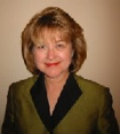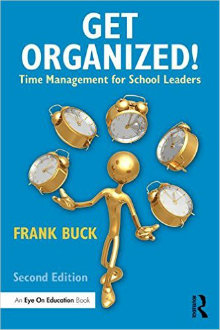Easy Ways for Educators to Get Organized
Get Organized! Time Management for School Leaders, Second Edition
By Frank Buck
(Routledge/Eye On Education, 2016 – Learn more)
Reviewed by Mary Langer Thompson


Also, if you’re an organized teacher, you will most likely become a more organized administrator. How to manage your time, files, desktop, e-mails and more is a subject not normally covered in education classes, however, and Buck’s book is both practical and needed. It’s never too late to start!
A total organizational system
Buck provides a total organizational system for a busy leader, and doesn’t assume that you have an administrative assistant. His ideas cost nothing or very little, and the reader can start immediately. Digital strategies for our Information Age are also included. Buck himself has served in many instructional leadership positions and is now a consultant to both schools and businesses.
The author announces that we all have the same number of hours in our week, a gift of 168 of them. How we use them determines how successful we will be – and becomes our legacy. He also points out that if our jobs are more manageable, they will also become more enjoyable and less stressful, and we will be clearer, more confident thinkers.
And some of what we do might not need to be done at all.
The essential tickler file
Chapter One introduces Buck’s main technique, which he learned from his attorney father. It became a system the author never abandoned: the “tickler file.” The file is the first step to a clean desktop.
All one needs to implement this system is 43 folders and a desk drawer. He shows how to label your folders and how to rotate them each day and month. When you read about his system, you will want to go out and buy your folders. He shows specifically how it works “in action” and gives a starter list for what to actually place in the folders and what to do with incoming papers. After your folder system is in place, Buck tells you what you need for your desk drawers, including one ruler (not six).
This system alone served Buck well for many years, and although we still deal with a great deal of paper, now that we are in the digital age we need another tool introduced in Chapter Two: a “Signature Tool.”
Based on the premise that “when you can see all of your choices, you make better choices,” this tool should be the one place you keep appointments, tasks, and email communication. This used to be our paper planner that we carried with us everywhere. In this chapter, Buck explains why you should go digital, what every task needs to have, how to sort and identify repeating tasks, and how to use a “Note” section.
Digging in as new administrators
The third chapter coaches us on how to think things through one time only. He shows how “the devil is in the details,” and how you shouldn’t have to rethink them once you’ve completed a project once. Schools are places where most tasks are repeated over time, so keeping track is especially important.
Buck’s “Sample Repeating Tasks for Summer,” etc. will be especially useful for the beginning administrator. He gives tips on how to handle the manuals stored from year to year that sit in isolation. Also learn about the “Art of Delegation,” which he discusses separately for elementary and secondary schools, and even how to delegate to students and why. (There is a special section on saying “No”!)
In reading this book, you might realize some of the habits you have developed are not all that useful or productive. For instance, Buck will help you “get rid of the sticky notes” and other messy habits and put in place systems that will make your life easier. He will show how to break projects into small steps and keep related information with that project.
This author comes through as someone who cares about his reader and wants to help him or her build a reputation as somebody who is always “on top of things.” He will help you see that it’s not information that’s the enemy, but the lack of a system for handling it.
The digital life
Chapter Seven deals more specifically with transferring your paper system to your computer desktop and folders. He recommends three folders for everyone: Temporary Trash Can, Memos & Letters, and the Monthly Tickler. He recommends three folders to create if you have sufficient cloud storage available. He also discusses backing up files.
Chapter Eight makes Buck’s strong case for using the popular app Evernote. Chapter Nine shows how principal Mindy tackled the challenge of her school-wide math scores declining and how she took control and set a goal for improvement.
In the final chapter, Buck reminds us that “Time is My Friend” and we need to “Make today count.” Indeed, this book is a pep talk as well as a practical guide. The reader may have already devised a successful system for managing time, but the majority of us have been struggling with this issue forever and will most likely find something useful in this compact, informative book. (I didn’t get past Chapter One before going out to buy my 43 folders.)
Buck is an enthusiastic, knowledgeable writer, and I hope that Get Organized! soon becomes required reading in education and administrative classes. Wouldn’t it be wonderful to begin a new career or assignment well organized? Time is of the essence.
Read Frank Buck’s MiddleWeb articles about organizing your work
Dr. Mary Langer Thompson is is the author of Poems in Water, her first collection of poetry. She is a retired school principal and English teacher who still teaches poetry and writing workshops in schools and prisons and still works to “fit it all in.”






























